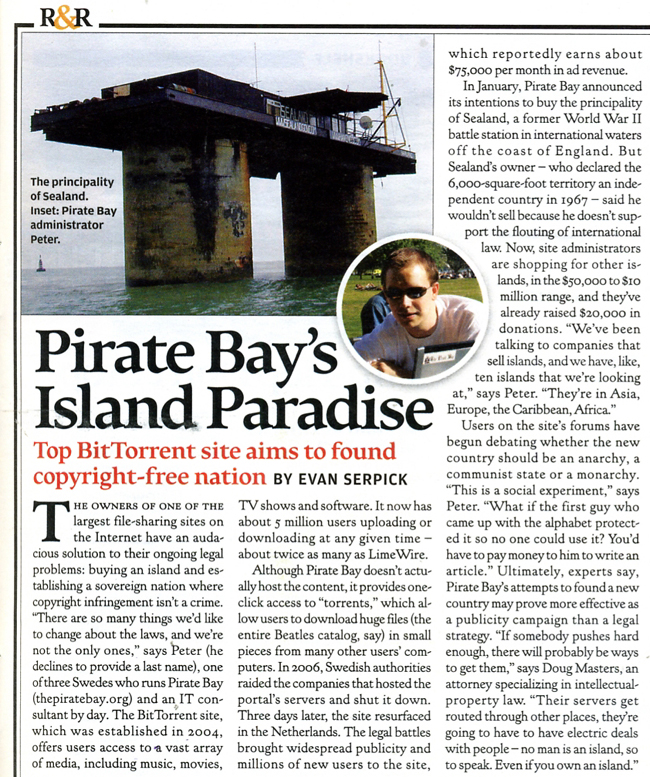Vanity Fair - still one of my fave reads, especially when it's the annual 'Hollywood Issue'. Stand out article? Steven Daly's report on 'Pirate Bay', the next level in file-sharing that's got the film studios melting under the collar.
Gottfrid Svartholm (pictured/below right), like Bram Cohen (Mr. Bit Torrent) is the latest uber-geek in the spotlight; love the hilarious/cocky 'legal threats' page on his site!!
Anyway, para-phrased piece/highlights below with full article here:
The dominoes continued to tumble through late 2006 as we read countless business-section stories about Hollywood's financial woes, along with heart-wrenching tales of movie-star salaries' being cruelly slashed by millions of dollars. When multiplex titan George Lucas came out with the startling announcement that his company had decided that making feature films was now "too expensive and too risky" in the current climate, my friend Richard's apocalypto vision of the show-business future started to seem more plausible than I could have ever imagined.
The publicity generated by the Pirate Bay raids gave a huge boost to the site's traffic, which already stood at more than one million visitors per day, and forced the company to hire five new workers to cope with merchandising demand. There are thousands of back orders for the original Pirate Bay T-shirt, which features a skull and crossbones with a cassette tape in the center. When Neij was wearing the shirt on a 2006 business trip to San Francisco, he was surprised to find how far the Pirate cult had spread. "There was a school class lined up outside a museum, a big group of eight- or nine-year-old American kids. And a bunch of them started pointing at me: 'Hey! Pirate Bay! Cool!'"
Among the few senior entertainment executives who have been able to absorb this seemingly basic aspect of human nature is Anne Sweeney, president of Disney–ABC Television. In her keynote speech at the October 2006 MIPCOM audiovisual-content market in Cannes, France, Sweeney broke ranks with her boardroom peers to make a bracingly pragmatic statement. "Piracy is a business model," Sweeney said. "It exists to serve a need in the market—consumers who want TV content on demand. And piracy competes for consumers the same way we do: through quality, price, and availability."
Sweden's beloved high-tech millionaire Jonas Birgersson derides the U.S. entertainment industry for its futile stand against evolutionary tides; he points out that although something like iTunes is regarded as a major boon to the music business, the innovative service was created by the computer industry. And now that iTunes has leveled the distribution playing field to the great disadvantage of major labels, Birgersson poses the question "What do you need these multi-billion-dollar companies with all their skyscrapers for? We shouldn't sacrifice a lot of these gains to prolong that system for another few years."
At the risk of sounding sentimental—or even, G-d forbid, anti-progress—there surely has to be a moment for speculation on what could be lost if the current scenario plays out to its logical conclusion. Internet pioneer Jaron Lanier, the man who gave us the term "virtual reality," is one of the few credentialed individuals to have spoken out against the coming age of "digital Maoism." If Hollywood's ancient regime is indeed swept away by unstoppable technological changes, the old patronage system may one day be regarded with nostalgic benevolence in light of the rising mob culture and YouTube novelty-storm that is replacing it.
"There are new business rules, and some art forms won't be able to be supported anymore," Birgersson responds. "I mean, in ancient Rome they used to stage full-scale naval battles in the Colosseum. We don't do that anymore." Sweden's "Broadband Jesus" appears to be suggesting that the sun is setting on the era in which Ben Affleck got paid $15 million for Paycheck.
So, the question remains: Will Hollywood adapt and survive, or will it continue to escalate its apparently futile battle against the collective intelligence of a million resourceful and highly motivated computer geeks worldwide? (The kind of people who recently unlocked the supposedly resilient copy protection on Hollywood's new HD DVD format.) Once again, the situation was adroitly summed up in the words of Anne Sweeney, no matter how unpalatable they may have been to the lunchtime crowd at the Ivy. In her 2006 MIPCOM speech, Sweeney plaintively stated, "We want to go wherever our viewers are. Viewers have control and show no sign of giving it back.''
UPDATE(D):
On the same tip, LOL! from this little nugget in recent Rolling Stone Magazine. Love the quote: "What if the first guy who had come up with the alphabet protected it so no one could use it? You'd have to pay money to him to write an article."

I went for abstract minimal.......
If if floats your boat, vote!!
© 2005 Green Bandana Productions Ltd. Website design by Steve Mannion.













